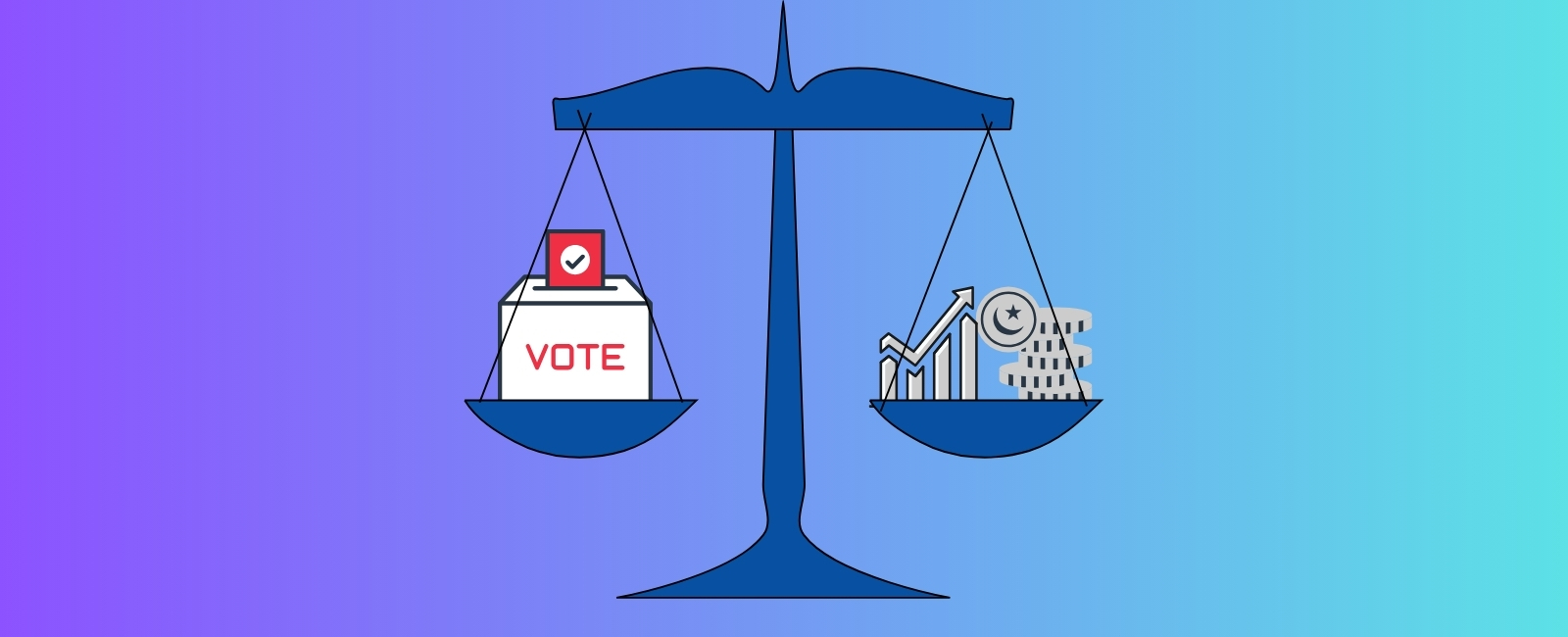Decoding Pakistan's electionomics
The choices made at ballot box carry weight of steering Pakistan towards a prosperous economic future

In the dynamic landscape of Pakistan's economic future, the forthcoming elections stand as a pivotal moment with far-reaching implications. As the nation prepares to cast its votes, the economic prospects become a focal point, influencing investor confidence, policy direction, and overall stability.
The outcome of the elections will shape the trajectory of Pakistan's economic growth, determining the effectiveness of fiscal and monetary measures. Stakeholders closely monitor promises made by political contenders regarding economic reforms, trade policies, and infrastructure development.
A robust and sustainable economic agenda can potentially unlock opportunities for foreign investment, foster job creation, and enhance the overall business environment. The choices made at the ballot box carry the weight of steering Pakistan towards a prosperous economic future.
Since the last several years, Pakistan’s economy has been characterised by a boom/bust cycle — periods of higher growth that result in increased import demand and shortages of foreign exchange. The resulting balance of payments crisis usually requires an International Monetary Fund (IMF) programme and a monetary and fiscal squeeze that reins in growth. This haphazard trajectory has meant a chronically underperforming economy.
Therefore, the initial economic conditions for the successor government after the elections will be characterised by the very high rate of inflation and low buoyancy in the real economy. The upcoming government will have to make an extremely crucial decision on whether to enter into an IMF programme, probably in the form of an Extended Fund Facility for three years as the stand-by agreement will end in April 2024.
It was learnt that Pakistani and IMF authorities are scheduled to hold virtual discussions early next week. Declining to comment on the political situation in the wake of the upcoming elections, Esther Perez Ruiz, IMF's resident representative in Pakistan, told Geo.tv that the next step in our programme engagement with Pakistan is to further the second review under the existing Stand-By arrangement, which extends through April.
‘Tsunami for the economy’
Economic Journalist Shahbaz Rana, while speaking to Geo.tv, said the new political setup should bode well for the purpose of long-term clarity on the political horizon, which is critical for Pakistan’s dealing with international financial institutions (IFIs).
“There are high chances that new government will engage with the IMF under a long-term programme, which would mean that the country will keep implementing tight fiscal and monetary policies. Under the IMF programme, Pakistan would be forced to implement a market-based exchange rate and it may be asked to restructure the debt,” he predicted.
The likelihood is that if Pakistan goes for a new IMF programme, the conditionalities and reforms required will be even tougher, more broad-based and structural in nature than in the previous programmes.
This will be essential to ensure that Pakistan’s economy becomes less vulnerable and foreign exchange reserves rise above the minimum import cover of three months during the tenure of the Programme.
However, while the chances of delaying elections have receded even if it happens in any situation, Rana said that the lender of the last resort may postpone programme negotiations and that would be a “tsunami” for the economy.
Elections and capital markets
Arif Habib Corporation Managing Director and CEO Ahsan Mehanti stated that timely general elections are expected to be positive for the Pakistan Stock Exchange (PSX), and rupee parity.
“Political uncertainty could be detrimental to PSX and rupee as well in case of unjustified postponement or cancellation. Stocks expected to trade at new all-time high amid strong economic data on falling current account deficit, government bond yields and surging foreign remittances in case of timely general elections,” Mehanti added.
At the stock market, the once-positive election fervour has morphed into election anxiety, temporarily shattering short-term business confidence, despite the prevailing promising medium-to-long-term outlook.
Since the announcement of the election date in the first week of November 2023, the benchmark KSE-100 index gained over 27%. Scaling unprecedented heights, it peaked at over 67,000 in mid-December 2023.
However, as the election date comes close to the countdown — which initially ignited a rally fuelled by optimism surrounding early signs of economic recovery and the anticipated substantial rise in low-priced stocks across the board —investors have opted to to sell stocks to secure profits.
Consequently, the bourse fell by almost 8% declining from an all-time high. The index hit a one-month low of 61,842 points last week (January 30, 2024).
When it comes to capital markets, history shows that elections impact the capital market. If we compare the past four general elections in the country since 2002, it should be noted that the PSX declined before and after the 2018 elections, while it grew before and after the prior three elections.
Unfortunately, currently, the cash-strapped nation is facing a significant decline in its economic indicators, reaching a point where conventional economic management measures may not be sufficient.
Navigating these challenging circumstances might require the implementation of tough, albeit unpopular, decisions.
These could include eliminating almost all non-targeted subsidies, passing on the actual cost of imported fuel directly to consumers, ensuring the strict collection of utility bills, and imposing taxes on sectors like agriculture, real estate, and retail. These sectors are considered highly influential, traditionally supporting various political parties and top leaders. Understandably, previous governments have hesitated to adequately tax these sectors, allowing the issues to accumulate over time.
A strong government is needed
Nonetheless, it needs to be emphasised that Pakistan would have to sign a new deal with the IMF — and that too immediately.
Dr Laila Farooq, Chairperson Department of Social Sciences & Liberal Arts Institute of Business Administration, told Geo.tv that the IMF negotiations are scheduled this month and some more tough decisions will be dictated.
“An elected government with a public mandate has the legitimacy to navigate these decisions. If the elections are delayed, the caretaker government will have to lead the negotiations and since this is not an elected government, its legitimacy is questionable,” she elaborated.
Dr Farooq highlighted that some non-elected bodies such as the Investment Facilitation Council have become more important although their relevance in a democratic set-up should be limited.
“Not just a legitimate, but a strong government is needed to take the economic and political challenges head on, otherwise it's more of the same turmoil,” she maintained.
The economic prospects entwined with Pakistan's elections hold the key to shaping the nation's financial destiny. The choices made during this democratic process will reverberate through economic policies, investor sentiments, and overall stability.
The post-election period will demand a collaborative effort from policymakers, businesses, and citizens alike to address economic challenges, foster growth, and realise the collective vision of a resilient and thriving Pakistani economy.
Afreen Mirza is a staffer at Geo.tv. She posts on X @afreenmirza97




